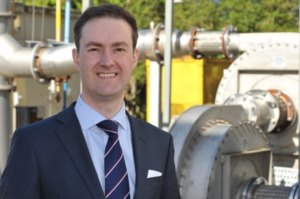SOUTH Bank-based research and innovation centre, Materials Processing Institute hit the headlines this month after it was announced that it is helping create special “metal powders” for use in 3D printing with the development of a new production facility on its campus.
This is part of a £10 million project to develop a new generation of powdered metals being led by global steel and industrial group Liberty with Tees Valley Combined Authority investing £4.6million.
The work has resulted in around 20 jobs in the short term, but in the long term around 250 new roles could be created.
It’s a major success story for Teesside and we asked Chief Executive Officer, Chris McDonald, more about the Institute, the contract and why they choose to be based in South Bank.

MPI Chief Executive Officer, Chris McDonald
Q: What can you tell our readers about Materials Processing Institute?
A: The Materials Processing Institute is a not-for-profit research organisation, specialising in commercialising technology for the steel and materials industries. The Institute was established in 1944 as the British Iron and Steel Research Association (BISRA). After many changes of name and ownership, the Institute became independent once again in 2014. The reasons for our location in South Bank are somewhat historical and associated with the former dominance of Teesside as a region in steel production. We have a strong and extremely positive relationship with our local authority (Redcar & Cleveland Borough Council). The Institute has a strong societal and ethical mission to support our local community. To achieve this we work with our local authority, the Tees Valley Combined Authority and the Tees Valley Mayor.
Q: What would you say have been the most important innovations and developments of the company?
A: Many of the standard technologies now in global operation in the steel industry were developed at our laboratories here in South Bank. These include technologies to improve process efficiency and new steel products.
Q: How important is it for Materials Processing Institute to have an international profile?
A: The global steel industry is second in size only to oil and gas and last year it grew by 8%. This growth was outside the UK and the same is true for the other materials industries supported by the Institute. For this reason, our international presence is important to enable us to maintain and grow our capabilities.
Q: Why is the Liberty Powder Metal project a key innovation?
A: 3-D printing has the potential to transform manufacturing, making machining, welding and fabrication redundant for many components. The value of products in the future will be mostly in the materials from which they are made and the design itself, rather than manufacturing. Liberty Powder Metals have recognised this, and they are aiming to be at the forefront of the development and manufacture of these new materials. This is real cutting edge, world-leading innovation happening in Teesside, because of the research expertise and facilities that we have at the Institute.
Q: What might the Liberty Metal project lead to in the future?
A: The real prize for the region is to create a cluster of materials and powder metallurgy businesses around this developing new knowledge and capability, leading to new factories and jobs. This is a strategy that Sheffield has deployed successfully for 15 years in advanced manufacturing, investing first in their research institutes and later seeing companies co-locating alongside them. What Sheffield has done in advanced manufacturing, we can do in advanced materials, so long as the innovation investment is available and targeted.
Find out more about the Institute at www.mpiuk.com






